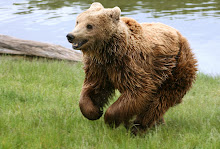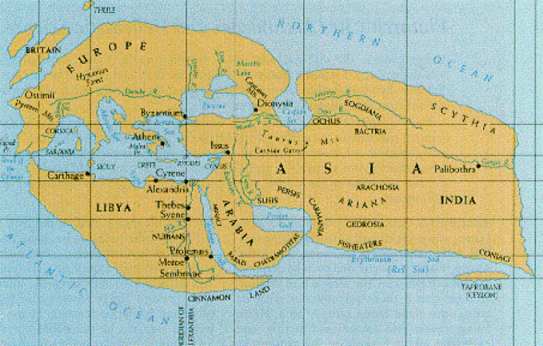Recieving his morning Levy at dawn, Lucius Cornelius learned from Lucius Decimus that whoever the competetion is, they set out from Capua five days ago. He told Lucius to keep his ear to the ground, but left the bandit wondering at the sanity of his patron as the latter claimed that there was no competetion for no one could measure up to him.
The party then set out, it consists of:
* Lucius Cornelius Scipi
* Caius Caecilius Rufus
* Caius Cominius Dolabra
* Aurelia Mento the beautiful doctor (Claudia Romani)plus an incompetent soothsayer
* 5 Evocatii
* Toxatai Kretikoi
* 5 Mulesters with 10 mules
* 5 other slaves (cook, barber, etc.).
* Lucius Cornelius’ Greek slavegirl.
14 combatants and 7 non-combatants in total. With 15 Campanian horses as gifts in addition to what they ride.
Lucius Cornelius was set on taking one of the excellent Roman roads north as he claimed that ships are unsafe, but let Caius Caecilius convince him to take the latter's ship that was currently moored in Ostia, ready to reload or to carry them all to Arelate which prospers under Julian rule as it supported Gauis Julius Caesar while its competitor was Pompeian. In fact Arelate and the Allebrogi Oppidum Vienna are both being marked as Caesarian colonia with veterans getting ready to relocate here from Italy.
From there they travelled north to Arausio, site of the greatest Roman defeat ever (and a chilly reminder that you are going to the lands of those that inflicted that defeat on Rome), then to the Allebrogii oppidum capitol of Vienna.
Travel through Narbonensis is much the same as through Italy. In fact, while Italy is getting depopulated, Narbonensis thrives with no draft and no war. Villages prosper and farmers till their fields. A few men are off fighting for Caesar, but that is it. Lepidus rules in peace from Narbo Martius and all is well.
Vienne is on the border of Narbonensis and the old capitol of the Allebrogii tribe, thus considerably rougher. No one learned anything of use there, and so pressed on towards Cabillonum and Andemantunnum, capitol of the Lingonii Tribe. Here they met and agreed on non-competition with a cloth trader, before they turned N-N-W towards the lands of the Mediomatricii and Treverii in Andemantunnum.
The rest of Gaul is a different matter. Very depopulated and with widespread devastation only healing Gaul exists in a sort of power vacuum, waiting to be filled out and repopulated. Patrols of Roman Auxilia and local allies keep the peace, but they are necessary in order to do so, though it seems as Caius Caecilius put it, "as if anyone not liking us above the age of three are dead". Caesar pacified gaul very effectively and purged it of antiroman sentiments by fire and Gladius Hispanensis.
This is not entirely correct though, there are still some anti-roman sentiment left, especially in the border provinces, and as they pass through the land of the Mediomatricii they meet fleeing Roman Publicanii as well as a few locals.
Claiming Germanic descent (probably through warrior class conquest as the later Normans could claim Viking descent), the Treverii is just that little bit more fierce and less civilised than the rest of the Gauls (which says a lot). and a civil war has broken out between supporters of Rome and people wishing for freedom. At the moment it seems mostly on Blood-feud level between nobles, but Romans and romanised locals are targets and flare-ups at local level tends to happen near Romans and other southerners (incliding southern "soft" Gauls), and to leave these dead. And a few German warbands have turned up as mercenaries.
Lucius Cornelius and Gaius Caecilius agree that turning west through the semi-hostile lands of the Belgae tribes and south of the impassable Arduenna Silva is preferable to a civil war that will likely drag out till the Romans quench it, and do so.
Belgica is even wilder than Gaul, and the people fiercer, owing to Germanic influence and neighbours, and distance to civilised lands. But it is part of the greater Gallic influence with oppida, torques and woad warpaint, the art, songs and sagas are also Gallic in nature. They pass the Remii lands, home of the most famous (heavy) cavalry in greater Gaul, ever faithful to Rome and with the large (second-largest in Gaul) Durocortum as capital. The vanguished Suissones who once excerted power over most of Belgica and S. Britain. The Bellovacii who resisted Caesar stubbornly till defeated and turned by his clemency to strong support. The vanguished Ambiani around Samarovbriva. And lastly arrives in the land of the Menapii. The Menapii is the last Belgae people to have submitted to Rome (The Morinii are still resisting from their Polders), and despite a heavy campaign of devastation and hard occupation by Caesar's ally Commius of the Atrebates they are only now submitting. Caesar's menapii ally Dumnorix still waging war in the south (I mistakenly said N during the game, sorry), where the southern chiefs are allied with the Morinii in their resistance. Being thus busy, Dumnorix has but little time to aid the expedition, and a banquet with promise of help from his subchief at the harbour town, Boridunum.
here the Roman nobles gets their first taste of barbaric feasting and exchanging of gifts. The barbarians, who has never seen a black-haired beauty before, are most interested in Aurelia Mento, the doctor, but she is not available. And Lucius Cornelius keeps his Greek slavegirl, Aglaia (Αγλαΐα), well away. Instead the Romans gets Torques according to their status, but of massive gold, and Lucius Cornelius a huge (5 l) drinking horn with much gold inlay. Reciprocating the gift with gladiatorial armour (maiming a PoW to show what gladiators are all about) and a stone fallos in secret for his wife. Much merriment is then had with Caius Cominius preferring beer, Caius Caecilius not much liking beer or mead, and Lucius Cornelius very keen on mead while detesting beer. No one is killed, and everybody parts as friends the next day where Caius Caecilius finds a local log trader to exchange the wagons for logs and a guide for. The guide/foreman and workers float the logs to Boridunum with the party watching, but the last day they notice an uneasy feeling in the land and locals. A few farms has been burned and some farmers seem frightened, while there is traces that a small convoy was annihilated not too long ago. The feeling persists in Boridunum, even to the rulers and even the guide is puzzled.
In the great hall of Boridunum, Lucius Cornelius and his entourage are presented to the local chieftain; Virodomarus, his son in law and advisor; Erasnactos and the Roman Publicani, Marcus Spurius Blaesio. The latter is a descendant of a freedman of the great Cnaeus (Gnaeus) Cornelius Blaesio.
These too seem pensive. Erasnactos is a tall and slender young man of great beauty whose black hair hints at Roman or Greek blood somewhere back amongst his ancestors. He is verging on the effiminate. Marcus Spurius is fat and known for corruption and vice, while Virodomarus is a typical gallic chieftain; large and imposing. He seems to have lost some of his edge though, but is still able to rule his tribe and recieve important guests. They are well-recieved and a feast will be held in the evening in their honour, while all available aid will be given to them. Information on the local situation is not easy to get from them. They claim that it is but a few rebels stirring things up and that nothing is wrong.
However, Caius Caecilius' business partner in the lumber trade sniffs out a lot of information for them.
Despite the general opposition to Roman intrusion when Caesar invaded their territory, some Menapii joined his armies as mercenaries earlier when he fought the other gauls. One such was a local farmer/fisherman named Morbo. He fought well for the Romans and was released with honours after six years of service last year. The highly decorated veteran then went home with his saved plunder and pay to have a merchant ship built for the trade with the tribes in Britain. Tribes related to the Belgae and with many ties to them, Commius of the Atrebates- formerly ruling the Menapii for Caesar- moved there after his fallout with Caesar and now rules the British Atrebates. Morbo thus could expect good trade and gain in his new peaceful life. he took a wife and settled down to trade.
This was not to last, Marcus Spurius has interests vested in trading across the Channel, and he somehow convinces Virodomarus to confiscate Morbo's ship on an imaginary charge. Many locals are outraged by such injustice and Morbo himself disappears. It later turns out that he has taken to the woods and marshes, and gathered his old followers and friends to him as well as new followers to start a campaign of brush warfare against Virodomarus and Marcus Spurius; burning farms, ambushing convoys and killing their supporters.
That is the status of things now, Morbo's men strike at will at night and disappear during the day, no one knows where, and they seem to know everything that the Chief undertakes against them in advance.
Evening approaches and the banquet started when circumstances forced us to stop.
Friday, 4 September 2009
Subscribe to:
Post Comments (Atom)


_running.jpg)







Sorry about the delay in publishing, I have had something weighty on my mind, at least something weighty to me.
ReplyDeleteMy other comment is that our effective playing time in this session, with our late start, early end and many disturbances, was max two hours. That is highly dissatisfying to say the least. I hope I am not alone in this feeling.
Sometimes things don't work out the way we plan them.
ReplyDeleteI'm looking forward to the next game, as I will be playing the ravenous horde of baying beastmen, and you will be the puny humans whose throats I shall tear out and whose life blood I shall drink!!!
Eh?? You are mixing campaigns mon ami Moif. here you play the heroic Lucius Cornelius.
ReplyDeleteThe Beastman horde did not really work out the way we planned either did it?
ReplyDeleteOh well, back to Gaul.